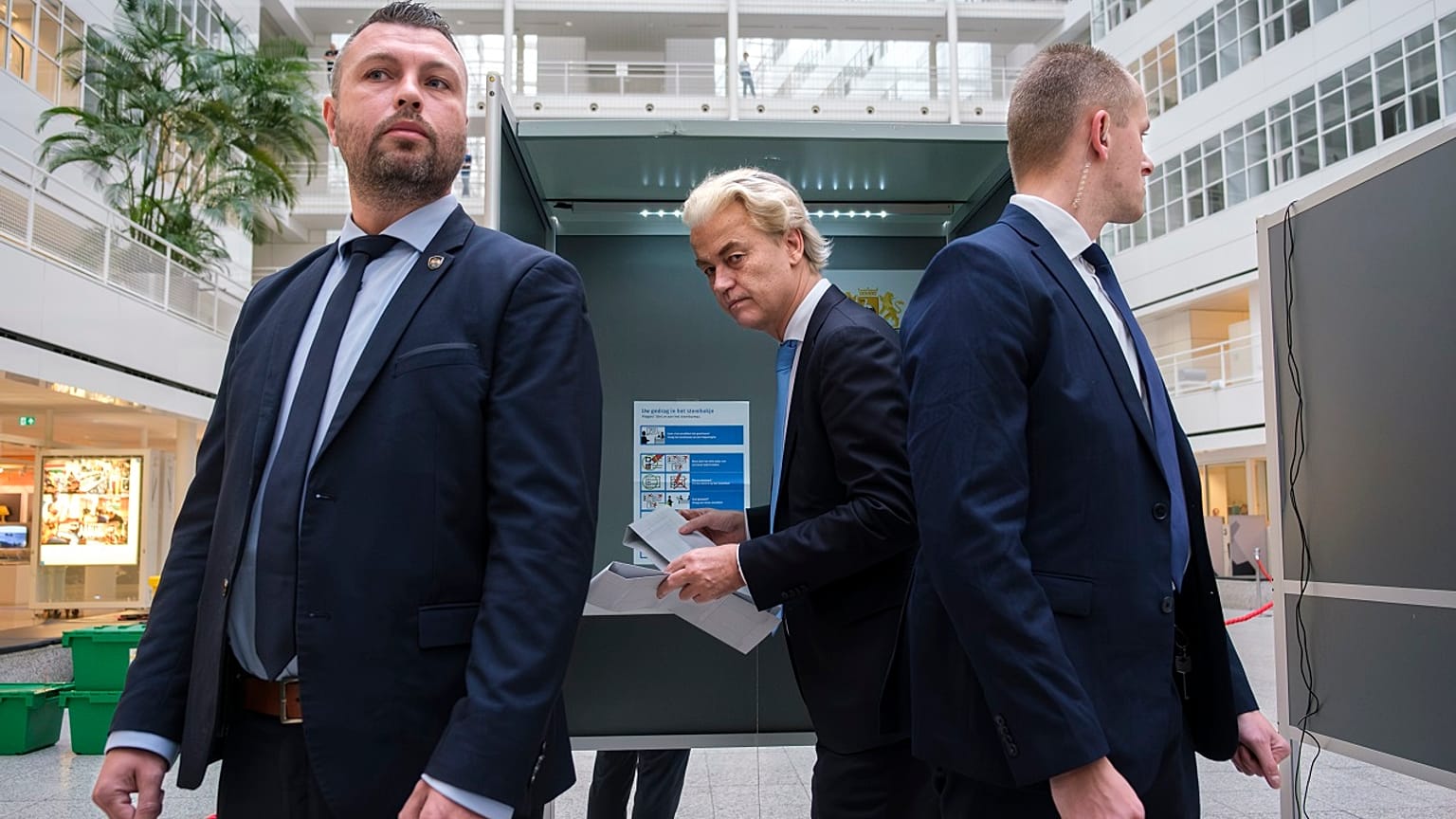Topics including migration, the economy, housing and foreign affairs are expected to dominate the campaign.
 ADVERTISEMENT
ADVERTISEMENT
The far-right Party for Freedom of Geert Wilders, PVV, is leading in the latest opinion polls with two months to go to fresh parliamentary elections in the Netherlands.
The snap elections were called for 29 October after the PVV left the coalition government in June over a disagreement about migration policy.
Just as the political campaigns are kicking off after the parliamentary summer recess ended, the latest polls suggest that the PVV would win 33 seats in the 150-seat parliament, followed by the centre-left joint list of the Greens and Labour party, GroenLinks-PvdA, forecast to take 26 seats.
Support for the current government coalition partners – the centre-right VVD, far-right and pro-farmer BBB party and conservative NSC – has decreased significantly, the same poll suggests. The biggest losses are projected for the VVD: forecast to drop from 24 to 15 seats.
Wilders’ PVV emerged as the winner in the November 2023 elections (37 seats), followed by GroenLinks-PvdA headed by former European Commissioner Frans Timmermans (24 seats). No party will manage to achieve an absolute majority in parliament: the Netherlands has always had a coalition government formed by at least two parties.
It’s been an eventful couple of months in Dutch politics, here’s what to watch out for in the campaign in the coming weeks.
1. Israel policy
The Netherlands took the initiative in May to ask the European Commission to review the EU-Israel association agreement after critical aid supplies did not enter Gaza for more than ten weeks: a violation of international humanitarian law.
The move by Foreign Minister Caspar Veldkamp – an NSC minister – wasn’t appreciated across the board: the Dutch government is still considered an ally of Israel.
Wilders’ PVV continues to give firm support to Israel, while some other parties including GroenLinks-PvDA and the centre-left D66 have spoken out against the Israeli actions and are in favour of recognising the Palestinian state. This divide could be a stumbling block in the process of forming the next government.
Veldkamp, a former Dutch ambassador to Israel, last week resigned from the interim government, saying that he wanted stricter measures on the country. He found little support with the other coalition parties, VVD and BBB.
His move triggered the departure of all NSC ministers, meaning that the outgoing Prime Minister Dick Schoof will have to appoint new ministers and possibly restructure the outgoing government.
2. Downfall of the VVD, rise of the CDA
While the VVD, the party of former Prime Minister Mark Rutte – who led the Netherlands for 14 years and is now heading NATO – is declining in popularity, the Christian-Democrat CDA sees its seats forecast to rise to 23 seats, making it the third largest party, up from five seats in the previous election.
The party, which had big wins in the 2000s, emphasises controlling migration, economic investment, and democratic and societal values, and is supportive of the EU.
Media reports suggest that its 42-year-old leader, Henri Bontenbal, is gaining popularity across the political spectrum and has potential to become the next prime minister. He entered politics some four years ago and is therefore considered a fresh face.
At the same time, polls show that support for the current VVD leader, Dilan Yeşilgöz, is declining. While in June some 77% of VVD voters said they had confidence in her, this rate is now at 31%. Yeşilgöz, who took over as party leader from Rutte in 2023, has faced criticism for adopting a leadership style considered to be far-right “light”.
3. PVV: closing the borders
Wilders entered the campaign with a stricter program on migration than his party had while in government. The party advocates for a complete stop to immigration, wants to close migrant reception facilities and to send back asylum seekers at the border.
Wilders, who has been leading the PVV since 2006, sparked criticism earlier this month with his AI-generated post on X, showing two half faces: on the left, a young blond woman with the letters PVV underneath, on the right, an angry-looking older woman wearing a headscarf, with the letters PvdA underneath.
Wilders wrote: "The choice is yours on 29/10", referring to the date of the elections.
More than 2,500 complaints have been filed with an anti-discriminatory hotline on the post.
4. Finally, Timmermans’ turn?
Timmermans is again leading the centre-left GroenLinks-PvdA joint list, as in 2023. The parties will formally merge in 2026 and try to appeal to centrist voters with an agenda focused on energy, housing and public investment.
His biggest challenge might be to gain support from his voters, as GroenLinks and PvdA traditionally were not aligned on all election topics.
The former European Commissioner for the Green Deal is keen to become prime minister this time around, as he missed the opportunity in the previous elections and left his Commission job for it two years ago.
He recently told Dutch media there would be "nothing to fear” with him at the helm of the country.














